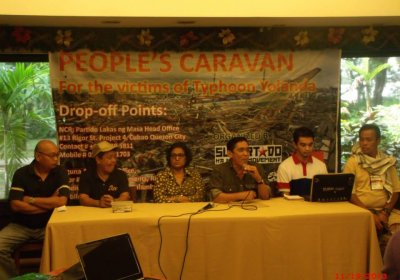The Manila Seedling Bank, a seven hectare area of small market gardens and big and small shops selling plants, was a rare green space among the traffic jams, shopping malls and slums on the intersection of Quezon and Edsa Avenues in Quezon City, Metro Manila.
It was also home to a community of hundreds of smallholding horticulturalists and their families. That was until January 20.
Philippines
Residents in the urban poor settlement of San Dionisio in Barangay Cupang, Muntinlupa in Metro Manila, were woken on January 15 by a heavily armed police SWAT team.
Brandishing a local government order that referred to an address in a different barangay (neighbourhood), authorities overrode objections of residents and started tearing down their homes.
“When we went out, it was like a Zombieland,” Zoreen Agustin, a student at the University of the Philippines’ (UP) Tacloban campus told me on December 2.
“A lot of people were walking around, some with no shoes and their clothes all torn, a lot of people were covered in cuts.”
She was referring to what she saw after Tacloban, and much of the Eastern Visayas region, were demolished by Super Typhoon Yolanda (known as Typhoon Haiyan outside the Philippines) on November 8. The storm, one of the strongest on record to hit land, killed anywhere between 5000 and 10,000 people.
After the storm, the “shock doctrine”. This is what awaits the Philippines after the devastation wrought by Typhoon Haiyan.
The familiar cycle of “disaster capitalism” allows wealthy and politically connected First World corporations to profit obscenely from the suffering of acutely vulnerable disaster-affected communities.
Disaster profiteering is a parasitic tendency deeply embedded in the structures of the neoliberal global economy. It will degrade and corrupt the international “relief effort” under way in the Philippines.
The People's Caravan is a grassroots relief effort initiated by the Party of the Labouring Masses, a Filipino party of the marginalised and poor.
A revealing story about the lawsuit against the United Nations over a cholera outbreak in Haiti was broadcast on the Canadian Broadcasting Corporation’s The World At Six on November 13.
The report began: “The United Nations is among those leading the effort to get aid to the Philippines. But even as it helps out with this natural disaster, it is haunted by the ghosts of another.”
Catastrophic climate change due to greenhouse gas emissions from industry is not merely a future threat for humanity. It is happening now.
When Super Typhoon Yolanda (known outside the Philippines by its Chinese name, Haiyan) slammed into the islands of Samar and Leyte in the Philippines’ Eastern Visayas region on November 8, and cut a path of destruction through the Visayas, it was the strongest storm ever recorded to hit the cyclone-prone Philippines.
According to some scientists, it was strongest storm to ever hit land anywhere on Earth.
“We have two Filipino traits -- Bayanihan, solidarity, community spirit, and Bahala na, daring, grit & luck,” said Sonny Melencio, chairperson of the Party of the Labouring Masses (PLM). “These will guide our People’s Caravan.”
The People’s Caravan initiative is organised by the PLM (a national political party of the marginalised), the transport workers' union PMT and the Support Tado campaign (a networkt to support TV personality Tado Jimenez for elections in Marikina).
The statement below was released by the Party of the Labouring Masses, a Filipino party of the marginalised and poor. You can donate to the grassroots relief efforts the PLM is part of organising.
* * *
About 1000 people rallied on November 11 in front of the US Embassy in Manila to demand climate justice after the aftermath of Super Typhoon Yolanda (as Typhoon Haiyan is known in the Philippines).
The demonstrators care from various sectors of Filipino society. Farmers, urban poor, women, workers, and youth marched from Bonifacio Shrine to the T.M. Kalaw demanding that the US immediately and radically cut its emissions and pay its climate debt -- to assist with the costs of adapting to climate change and for loss and damages caused.
Below is an open letter and petition to governments of the rich industrialised nations, initiated by the Philippines Movement for Climate Justice. The PMCJ is a broad movement consisting of 103 national networks and local groups representing many grassroots communities across the Philippines.
Please add your name here. You can also donate to grassroots relief work via http://transform-asia.org/.
* * *
The statement below was released by the Party of the Labouring Masses (PLM, a Filipino socialist party) on November 10 in response the huge humanitarian disaster caused by Typhoon Haiyan/Yolanda. Details on how to donate to the PLM's relief efforts at at the bottom. You can also sign a petition initiated by the Philippines Movement for Climate Justice.
* * *
Let Our People Live! Save Lives, Redistribute Food, Stop the Economic and Environment Plunder! Climate Justice Now!
- Previous page
- Page 7
- Next page







